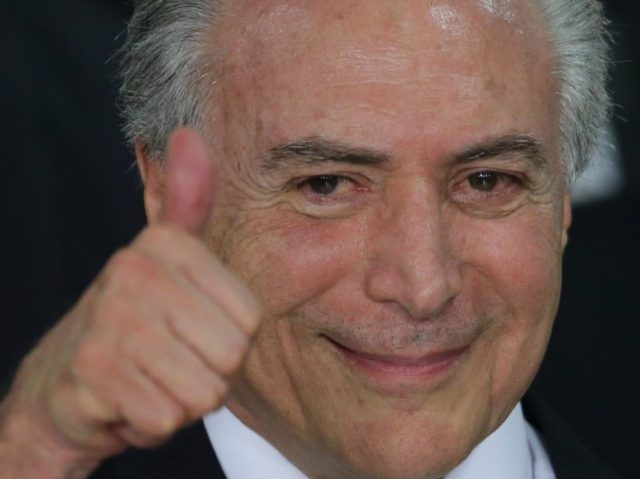Brazil’s new president Michel Temer promised to return trust and “confidence” in the executive government to the Brazilian people in his first speech as president, shortly after Dilma Rousseff was informed that her impeachment was official and she would be forced to step down.
“My first word for the people of Brazil is the word ‘confidence,'” Temer said in his inaugural speech, which he insisted have a “sober and discreet” tone. “Confidence in the values that form the character of our people, the vitality of our democracy,” he added, with a acknowledgement that “it is urgent we pacify the nation and unite Brazil. It is urgent to create a government of national salvation.”
He spent most of his speech on the damaged Brazilian economy, vowing to renew trust in the country on the part of foreign investors and attract corporations that could provide jobs and take the burden off of the government. He noted a billboard he had seen at a gas station in passing reading, “Do not talk about the crisis: just work” and promised to do just that.
As a member of the traditionally center-left Brazilian Democratic Movement Party (PMDB), however, he also issued a promise not to put an end to the variety of social programs that had been enacted under Rousseff, crippling the national budget. He issued his respects to her and promised to keep the poor well cared for through the transition period.
Significantly, he also noted that the billion-dollar corruption investigation known as “Operation Car Wash” needed “protection against any attempt to weaken it,” and he promised to give federal courts all the necessary resources to investigate and, if necessary, convict the dozens of politicians embroiled in the scandal.
On Thursday, Temer also introduced his new cabinet, including a number of members of the center-right Brazilian Social Democratic Party (PSDB). The presence of these “toucans” (they are known in Brazil by their mascot) in a PMDB government rattled some PMDB loyalists. It has also given fodder to leftist outlets looking to brand Temer a right-wing figure. The New York Times predicted that Temer’s ascent to the presidency “could cause a significant shift to the political right in Latin America’s largest country.” The Times noted the PSDB presence while, far down in their report, conceding that Temer had not only filled most positions with PMDB members, but kept around a number of members of Rousseff’s socialist Workers’ Party coalition. As a particularly acute example of Temer’s lack of right-wing credentials, the one woman considered for a post in his cabinet, the Times notes, was rejected shortly after the revelation that she had worked to limit abortion rights.
Far-left outlets like Telesur have gone so far as to accuse Temer of being a “U.S. informant,” citing a Wikileaks tweet with no context.
The history of the PMDB belies this effort, heavily pushed by Rousseff, who has routinely referred to Temer as a “traitor.” The PMDB’s history is rooted in leftist opposition to military juntas; its webpage boasts about their commitment to “reverse the scenario of social injustice cultivated for 500 years in Brazil.”
“The PMDB wants to organize and represent a broad social base: large urban and rural working masses, the technical staff and professionals, employees of offices and companies, civil servants, entrepreneurs and property owners in the city and countryside,” their website reads.
While the PMDB may be more business-friendly than the Workers’ Party, Brazilians appear little convinced that the difference between Rousseff and Temer will be enough to right the direction of the country. A poll released in April and taken in the nation’s largest city, Sao Paulo, found that more than half of respondents wanted Temer to be impeached, as well.

COMMENTS
Please let us know if you're having issues with commenting.